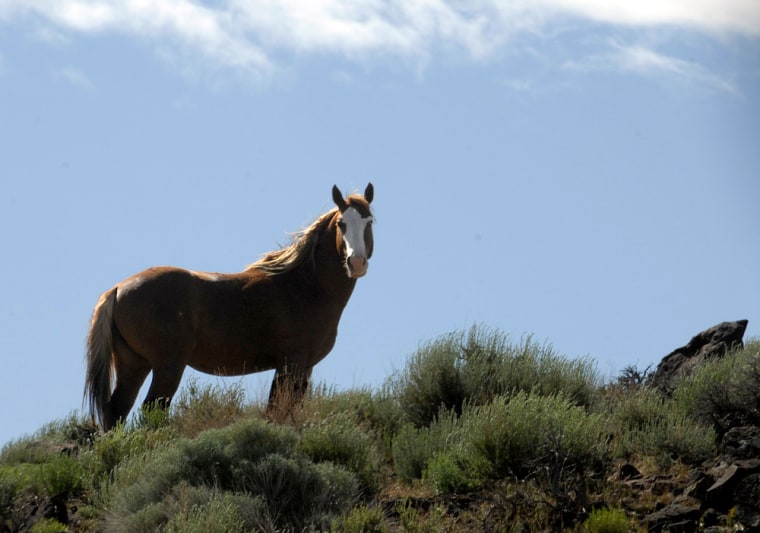The wife of Texas oil tycoon T. Boone Pickens wants to create a refuge for wild horses, after the U.S. Bureau of Land Management said it was considering euthanizing some of the 33,000 wild horses roaming the open range in 10 Western states.
Madeleine Pickens said Tuesday that she has proposed purchasing around 1 million acres to serve as a refuge for those wild horses now in holding facilities, and that the BLM has agreed to give her the horses once she has the land.
BLM spokesman Tom Gorey said the agency welcomes the offer. "Right now we couldn't be more pleased with her interest, and we hope that materializes so that we can get many of these horses out of holding," he said.
Pickens said animals brought to the refuge will be sterilized, and she will be able to take the extra horses the BLM takes out of the wild each year as well.
"We will never turn an animal down," Pickens said.
Pickens said she is negotiating the purchase of the land but would not say where it was. She's also creating a foundation to help with the project.
"I feel this tremendous relief," Pickens said. "I feel like the wagon is surrounded and instead of being surrounded by evil, it's surrounded by people who are willing to help."
Pickens, the child of British father and Lebanese mother who grew up in the Middle East and went to school in England and France, said she always had a love for the West and wild horses.
"It's such a beautiful sight to see," Pickens said. "This is our national heritage, and it needs to be preserved."
Trying to avoid 'last resort'Gorey said that while the BLM has authority to euthanize the surplus horses, it's an option the agency did not want to have to exercise.
In order to protect the herd, the range and other foraging animals, the BLM wants to have about 27,000 horses in the wild. So those too old or considered unadoptable are sent to long-term holding facilities.
BLM Deputy Director Henri Bisson on Monday said the agency would round up fewer wild horses and try to shuffle funds to hold off for now on killing large numbers of the animals.
Maintaining the wild horse and burro program for another year will give horse advocates, the BLM, Congress, ranchers and wildlife advocates time to explore possible solutions and let "cooler heads prevail," he said.
"Let's focus on doing something positive before we have to look at last resort tools," Bisson said. "We're not making any decisions today. We're not making any decisions next week."
Half of all wild horses are in Nevada. The horses and burros are managed by the BLM and protected under a 1971 law enacted by Congress.
The agency rounds up excess horses and offers them for adoption.
The National Wild Horse and Burro Advisory Board is considering ways to help spur adoptions that have slowed in recent years and to curb population growth as a way to reduce long-term holding costs.
Bisson told the same group in June that the agency faces a crisis because of the skyrocketing costs of caring for the horses in long-term facilities where the animals live out their days — some for as long as 20 years.
Millions spent on caring for animals
A report released last week by the Government Accountability Office, the investigative arm of Congress, said the BLM this year will spend about $27 million — about three-fourths of its budget — caring for the animals. Continuing current practices would require a budget of $58 million next year, escalating to $77 million in 2012, BLM estimated.
The report also noted that the BLM has authority to kill or sell excess horses without restriction from slaughter.
Some advocates who oppose euthanizing horses say herd sizes are a result of years of agency mismanagement. They also say horses are given short shrift on public lands because they compete with livestock for forage.
Bisson projected the agency needs to find $15 million to $20 million elsewhere in its budget to sustain the wild horse program through the year.
Government roundups will be limited to about 5,000 horses and mostly involve animals facing severe hardship because of conditions such as drought.
